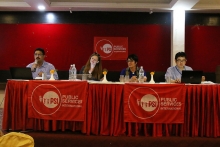Unions in Nepal commit to ILO Guidelines for Decent Work for Public Emergency Service Workers

In his introduction, Sub Regional Secretary for South Asia R Kannan underlined that in a country like Nepal that faces natural and man-made disaster situations of varied intensities on a regular basis, these guidelines are of utmost relevance. The devastating earthquake of 2015 showed the dedication of first responders as well as the power of organised communities in a post-emergency context.
Rosa Pavanelli, PSI General Secretary, said that challenges posed by climate change raise the need for special protection for first responders. While most discussions about climate change focus on decreasing carbon emissions, PSI decided to bring workers’ rights into the debate, such as the importance to protect emergency workers when they respond to the impacts of climate change. For this, PSI took as starting point the right to form unions, bargain collectively and strike, when required.
“Attempts are also made to use the context of emergency situations to curtail the right to organise, bargain and strike. This is in addition to the fact that these rights are not necessarily respected in normal circumstances either. It is significant that it has been included in the ILO guidelines as it gives workers and their unions a tool to open up the discussion at the national level”, she said.
Further, Pavanelli explained that private capital and companies have used post emergency contexts to attempt to take over resources and assets, which she termed as inacceptable. PSI brought this into the ILO discussion and the Guidelines specify that PES should not be privatised due to their 'extremely strong public nature” (para 35). Further, she stressed the importance of safe conditions of work.
“Emergency service workers risk their lives, and this is an intrinsic part of the work they do, but there are ways to minimise risks. Proper protection, training and tools and equipment are barriers to the loss of life. And protecting emergency service workers means better protecting the communities that are dependent on their work. When they lose their lives, they are considered like heroes. But we don't want heroes, we want workers treated with dignity throughout their lives”, she concluded.
Sub Regional Secretary for East Asia, Hiroo Aoba, explained that one of the significant advancement in these guidelines, compared to earlier documents, include the broader definition of PES workers, beyond first responders (traditionally understood as fire, police, ambulance and emergency medical technicians) to include most workers providing services to the public, such as electricity water, local government and health (para 11). Another important addition, that is of great importance in the context of Nepal is the setting of new standards for volunteer work and the commitment to ensuring that volunteers are not used to reduce public obligations to staffing and decent work (para 122). (More information on the Guidelines here).
In the discussion, participants from different sectors shared the prevalent conditions of PES workers in Nepal. The electricity authority of Nepal has 11,000 staff working there. Most of the risk is born by the technical staff due to the high voltage in the electricity lines. Accidents or emergency situations can result in loss of limbs, or even loss of life. In cases of loss of life, families have sometimes not been given proper compensation under the excuse that the electricity authority is not profitable. Further, participants shared that in the aftermath of the 2015 earthquake, firefighters were deployed constantly for one month, to overcome fires as well as for safe demolition, which has led to many of them falling sick. Even the compulsory oxygen masks were not always used. Preparedness is also lacking as there is no process to identify new needs for equipment or inputs of safety equipment. For instance, it was shared that fire engines are not adapted to deal with the narrow streets of the capital or with the taller buildings coming up in the city, such as large malls. The situation is worse in remote areas, where often there are no ambulances, or no water cannons with tanks, for instance.
Participants also spoke of the challenges posed by informalisation of employment. Permanent workers are pushed to take so called Voluntary Retirement Schemes (VRS) and leave the job, while new workers have irregular conditions without social security and other rights. Outsourcing is also seen within public entities, and exploitation in the private sector is severe. It was highlighted that without job guarantee and without other work opportunities, the possibility to refuse unsafe work is compromised, which is one of the rights that the Guidelines commit to.
The Guidelines will be presented to the ILO Governing Body in November for approval. PSI affiliated unions in Nepal will engage the government to ensure its support for the Guidelines.
“PSI's ESW network will contribute to this process by creating a space for sharing experience and using the knowledge that we create from our own experience to contribute and shape policies at national, regional and global level”, asserted Kate Lappin, PSI Regional Secretary for Asia Pacific in her closing remarks.
Participants included airport workers, community health workers, hospital workers, water and electricity service workers, and civil service workers, and other members of the Union of Public Services in Nepal (UPSIN), the Nepal Civil Services Employees Union (NCSEU), the Nepal Film Workers Union (NFWU), the Nepal Customs & Airport Allied Workers (NCAWU), the Health Professional Organization of Nepal (HEPON), the Nepal Health Volunteers Association (NHVA) and Health Volunteer Organisation of Nepal.


